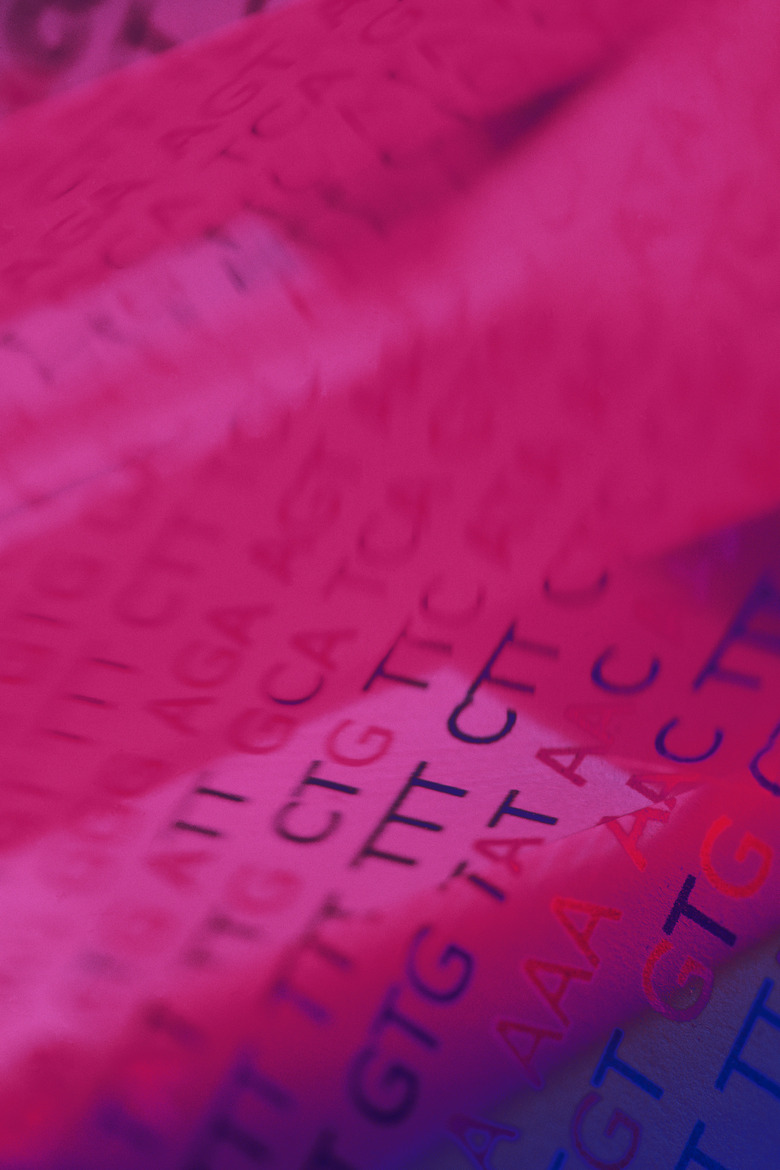Definition Of A Mutation In Terms Of Molecular Genetics
A mutation at the molecular level refers to any addition, deletion or substitution of the nucleotide bases in the DNA. DNA is composed of four different nucleotide bases, and the order of these bases forms a code for amino acids, which are the building blocks of protein. The order of the bases in the DNA must be maintained to ensure that the appropriate protein is made. But several different types of mutations can occur in the DNA. These range from having little to no effect on the protein product to preventing the proper protein from being made.
Silent Mutation
Silent Mutation
A silent mutation, or point mutation, refers to a change a single nucleotide base. When this occurs, a different base substitutes for a nucleotide base yet still codes for the same amino acid. The nucleotide bases code for amino acids in groups of three bases, known as codons. Some amino acids are coded through multiple codons, meaning that there can be more than one group of three bases which codes for that amino acid. In a silent mutation, the substituted base results in a codon that still codes for the same amino acid. Because the same amino acid is coded for, there is no effect on the final protein made from the gene.
Missense Mutation
Missense Mutation
A missense mutation is another type of point mutation, with a single nucleotide base being substituted. In a missense mutation, however, the substituted base codes for a different amino acid. The change in amino acid causes a change in the final protein that is made. The severity of the change to the protein depends on the type of amino acid substitution that occurs. Some amino acids are very similar to each other in their size and charge. If the amino acid is substituted by an amino acid with similar properties, there will likely be little effect to the structure or function of the resulting protein; however, if the substitution codes for an amino acid with very different properties, this can adversely affect the resulting protein and can even lead to production of protein that is either nonfunctional or has a different function. These types of mutations often lead to cancer.
Nonsense Mutation
Nonsense Mutation
A nonsense mutation leads to severe effects. It is another type of point mutation, since it is caused by the substitution of a single nucleotide base. In this case, however, the resulting codon codes for a stop codon, instead of an amino acid. In mammals, three codons code for protein translation to stop. If a base substitution codes for a stop codon instead of an amino acid, the production of the protein will stop prematurely, causing the formation of a truncated protein. Truncated proteins typically are nonfunctional because they are missing part of the protein. These types of mutations are very hazardous and can lead to many types of diseases, including cancer.
Frameshift Mutation
Frameshift Mutation
Insertion or deletion of nucleotide bases in multiples other than three causes a frameshift mutation. Because codons are read in groups of three bases, insertion or deletion of one or two bases causes a shift in the reading frame of the codons. This causes coding of completely different amino acids and leads to the production of a completely different protein. This resulting random coding can also cause a stop codon to be coded for in the middle of a gene, leading not only to a completely different protein but also a truncated one.
Cite This Article
MLA
Thompson, Noelle. "Definition Of A Mutation In Terms Of Molecular Genetics" sciencing.com, https://www.sciencing.com/definition-mutation-terms-molecular-genetics-4074/. 24 April 2017.
APA
Thompson, Noelle. (2017, April 24). Definition Of A Mutation In Terms Of Molecular Genetics. sciencing.com. Retrieved from https://www.sciencing.com/definition-mutation-terms-molecular-genetics-4074/
Chicago
Thompson, Noelle. Definition Of A Mutation In Terms Of Molecular Genetics last modified August 30, 2022. https://www.sciencing.com/definition-mutation-terms-molecular-genetics-4074/
